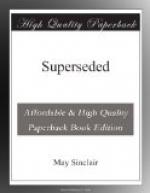The feather fluttered to the floor, and Martha ceased bending and peering, and looked at her mistress.
“She’s gone, m’m, I do believe.”
The Old Lady sank by the chair, her arms clinging to those rigid knees.
“Jooley—Jooley—don’t you know me?” she cried, as if in a passion of affront.
CHAPTER XII
Epilogue.—The Man and the Woman
By daylight there is neither glamour nor beauty in the great burying-ground of North London; you must go to it at evening, in the first fall of the summer dusk, to feel the fascination of that labyrinth of low graves, crosses and headstones, urns and sarcophagi, crowded in the black-green of the grass; of marble columns, granite pyramids and obelisks, massed and reared and piled in the grey of the air. It is nothing if not fantastic. Even by day that same mad grouping and jostling of monumental devices, gathered together from the ends of the world, gives to the place a cheerful half-pagan character; now, in its confusion and immensity, it might be some city of dreams, tossed up in cloud and foam and frozen into marble; some aerial half-way limbo where life slips a little from the living and death from the dead.
For these have their own way here. No priest interferes with them, and whatever secular power ordains these matters is indulgent to its children. If one of them would have his horse or his dog carved on his tomb instead of an angel, or a pair of compasses instead of a cross, there is no one to thwart his fancy. He may even be humorous if he will. It is as if he implored us to laugh with him a little while though the jest be feeble, and not to chill him with so many tears.
At twilight a man and a woman were threading their way through this cemetery, and as they went they smiled faintly at the memorial caprices of the living and the still quainter originalities of the dead. But on the whole they seemed to be trying not to look too happy. They said nothing to each other till they came to a mound raised somewhere in the borderland that divides the graves of the rich from the paupers’ ground. There was just room for them to stand together on the boards that roofed in the narrow pit dug ready for the next comer.
“If I believed in a Creator” (it was the man who spoke), “I should want to know what pleasure he found in creating that poor little woman.”
The woman did not answer as she looked at him.
“Yet,” he went on, “I’m selfish enough to be glad that she lived. If I had not known Miss Quincey, I should not have known you.”
“And I,” said the woman, and her face was rosy under the touch of grief, “if I had not loved Miss Quincey, I could not have loved you.”
They seemed to think Miss Quincey had justified her existence. Perhaps she had.
And the woman took the roses that she wore in her belt and laid them on the breast of the grave. She stood for a minute studying the effect with a shamefaced look, as if she had mocked the dead woman with flowers flung from her wedding-wreath of youth and joy.




